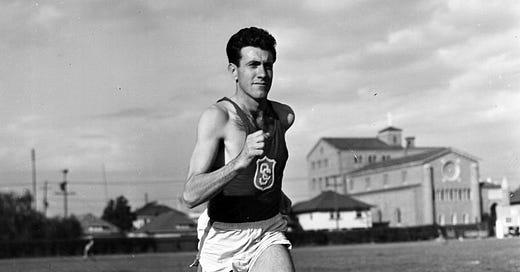It’s More than Just Win or Lose
Our actions today could very well dictate our tomorrow
This week’s Meditation at a glance:
This week we look into the actions we take today and how they help set us up for tomorrow. We review an event in Louis Zamperini’s life that helped to build his character and prepare him for the future he would be forced to experience.
In 1936, Louis Zamperini’s brother entered him into the Compton Invitational track meet at the Los Angeles Coliseum. Zamperini, who had been wanting to make the Olympic team for the mile, pushed back, but his brother persisted and convinced him to run, saying this would put him into a better position for the Olympics in a few years.
Zamperini was facing off against Norman Bright, one of the best runners in the country at the time.
Everything was going smoothly throughout the race. Zamperini and Bright were out ahead, and if everything stayed consistent, it would be a flip of a coin for who would win.
And then everything changed.
An official waves off one of the other runners, and that runner exits the track on the wrong side. When waved off, the runner was supposed to step left and make a smooth exit so as to not disrupt the other runners. Instead, he went right and cut across the entire track, in the process, colliding with Zamperini.
Zamperini could have laid there defeated, knowing there was no way to win the race. Instead, he scrambles to his feet and made his way toward Bright.
Zamperini caught up to Bright and it was once again the two of them, neck and neck, coming into the final stretch.
And then the official dropped the tape prematurely, quickly picking it up. The two pass the finish line. The officials tell Zamperini he lost by one or two inches.
This was the first race that Zamperini had lost. A devastating blow to his ego. And yet, he walked over to Bright and honestly congratulated him.
“I was determined to do it right,” he would write about his first loss. “If you give everything and lose, so what? It’s not going to put you in your grave. I walked away knowing I could handle defeat gracefully, and I had more self-esteem from that than from winning the race.”
Zamperini could have complained about the runner hitting him, he could have complained that the tape was dropped right before they crossed the line and it wasn’t clear who the actual winner was. But instead, he accepted the defeat with humility and pride knowing he gave everything he had.
The Stoics would say this is how we are supposed to act. That all we have in life is the choice of what we can control. For Zamperini, that was choosing to get up when knocked down, that was finishing the race he started, and that was accepting defeat with humility when it was handed down.
“That every event is the right one,” Marcus Aurelius would write to himself. “Look closely and you'll see. Not just the right one overall, but right. As if someone had weighed it out with scales.”
Zamperini losing did more than bestow humility, it built his character. Character is born not through words, but through actions. And not through a single action, but repeated actions--virtuous actions time and time again.
The loss helped strengthen Zamperini. He would go on to fight in WWII and be kidnapped and held as a POW. He was beaten daily, forced into manual labor, and mentally tortured.
We can never know how the events we’re going through today will dictate our future selves. How the actions we take now can transform us into someone with the strength needed for tomorrow.
Zamperini would write:
“I lost that race to Norman Bright, but I won the next and the next and the next. I was always in the spotlight. And my recognition or fame, for what it’s worth, was always with me whether I won or lost. Once you’re on top, you’re on top. Your achievements are real. They can’t take that away from you.”
We don’t know what tomorrow holds, so we might as well work to ensure we do all we can today.
Three Bullet Summary:
While much of life is setup in a win-or-lose fashion, each event we tackle helps build us for tomorrow
A loss today may be exactly what we need in the moment
By repeatedly doing our best and pursuing virtue, we build our moral character which we can and do lean on in times of need
Thank you again for reading and I hope you found this useful. Please feel free to heart, comment, or ask questions about this post. Suggestions are always appreciated and considered.
Until next week,
D.A. DiGerolamo





